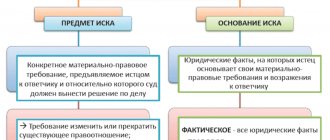Article updated: March 25, 2021
Alexey BessonovPracticing Moscow lawyer
Hello. I am a visiting lawyer from the Bessonov and Partners law firm. I specialize in discharging citizens in court.
Remember: You can ONLY discharge a person from an apartment without his consent THROUGH THE COURT. This is expressly stated in paragraph 1 of Art. 35 Housing Code of the Russian Federation and paragraphs. 5 (e) clause 31 of Government Decree No. 713 of July 17, 1995. There is NO other way.
Therefore, if a person refuses to be discharged or ignores such a requirement, the owners need to draw up a statement of claim, file it with the district court at the location of the apartment, win the case and take a positive court decision to the passport office or MFC.
IMPORTANT: It is better that all apartment owners agree to the person’s discharge. If one of them is against it and reports this in court, the claim may be rejected.
For convenience, I wrote separate articles depending on who needs to be written out:
- Ex-husband;
- Ex-wife;
- Ex-wife with children;
- Former owners of the apartment (it makes no difference whether they are relatives or not);
- A person who refused to participate in the privatization of the apartment (it makes no difference whether he is a relative or not);
- Their adult (adult) children, i.e. adult son/daughter/grandson/granddaughter - the instructions are the same;
- Brother or sister - general instructions;
- Common-law husband or wife;
- A stranger (stranger) person;
- A minor child;
- Former son-in-law.
If you haven't found a suitable option, continue reading. Here, too, everything is written in detail on how to discharge almost any person.
Cases and laws in which it may be possible to forcibly deregister a person
- Clause 1 Art.
209 of the Civil Code of the Russian Federation - The person who needs to be discharged must NOT be one of the owners of the apartment. After all, according to this article, owners have the right to use/live in their apartment, and therefore to be registered. Important digression: If the apartment went to the owners during privatization and the person refused to participate in it, the conditions for his discharge through the court are very different. Just like the instructions themselves. If this is your case, I have written separate instructions on how to discharge a person who refused to participate in privatization.↓ - Kinship is of primary importance.
Clause 1 Art. 31 of the Housing Code of the Russian Federation - family members of the owner include his spouse, children and parents. But in this paragraph of the article of the Housing Code there is one more addition - other relatives can be recognized as members of the owner’s family if they are installed by the owner as members of his family. Therefore, the courts have this logic - if a grandfather/grandmother, brother/sister, grandson/granddaughter, son/daughter-in-law, mother-in-law/father-in-law is indicated in the house register, then they are also a member of the owner’s family (clause 11 of the Resolution of the Plenum of the Supreme Court dated July 2, 2009 No. 14). Not family members of the owner: 1) Other relatives - uncle/aunt, nephew/niece, cousin/sister, etc. 2) Non-relatives - common-law husband/wife, friend, acquaintance, stranger. 3) Any citizens who were registered by the previous owner, even if they are considered relatives of the current owner. All because the current owner did not register them.↓ - Clause 4 art. 31 of the Housing Code of the Russian Federation - a former family member does not retain the right to use (reside) in the owner’s apartment, unless there was another agreement between them. Therefore, in order to discharge a person from an apartment, the owners need to recognize him as a former family member.
To recognize a person as a former family member, the owners need to know who he is:- An adult son, daughter, father, mother, grandmother, grandfather, sibling, grandson or granddaughter.
They will be recognized as former family members if: 1) they do not maintain a common household with the owners; 2) maintain a separate budget; 3) do not provide each other with help and support; 4) if the children do not live in the apartment, this will be an additional plus, but not the main factor for their discharge. All this is indicated in paragraph 13 of the Resolution of the Plenum of the Supreme Court of July 2, 2009 No. 14. Separate instructions - to register your adult (adult) children, brother or sister. Other articles will be added as they are written. - The rest are relatives and non-relatives. These include cousin/sister, son-in-law, daughter-in-law, mother-in-law, father-in-law, common-law husband/wife, friend, acquaintance, stranger, etc. In this case, the owner must indicate in the statement of claim that this person is not a family member and did not register him as a family member - clause 11 of the Resolution of the Plenum of the Supreme Court of July 2, 2009 No. 14. Separate instructions - how to register a common-law husband or wife or a stranger.
- Former spouse. After a divorce, the former spouses are automatically former members of the owner's family. My separate instructions are how to forcibly discharge an ex-husband or ex-wife.
- Former owners and those whom they registered. Clause 2 Art. 292 of the Civil Code of the Russian Federation - the former owner and members of his family do not have the right to live in the apartment after the transfer of ownership rights to another person. This article also applies to any person whom the former owner registered. How to register former owners with other registered owners, read the link -.
- Art. 304 of the Civil Code of the Russian Federation - the owner may demand the elimination of any violations of his rights, even if these violations were not associated with deprivation of possession.
There are exceptions. The following are those who should NOT be recognized as a former family member or non-family member:
↓
Does the person live in the apartment and his degree of relationship with the owners
Here, too, it depends on who needs to be discharged. If a common-law husband/wife, sister, brother, nephew, niece, aunt, uncle, friend, acquaintance, former owner or someone he registered lives, the fact of their residence does not affect the extract. The main thing is to indicate in the claim and inform the court that they are NOT family members of the owner.
It’s more difficult with other citizens if they live in an apartment - this is an ex-husband/wife, an adult child, a parent, a grandparent. Here it is important to find out whether a person owns another living space (apartment, room, house or share). If a person registered in court proves that he has nowhere else to live (register), the judge may decide to leave him a registration for a certain period, i.e. will retain the right to use the apartment - clause 4 of Art. 31 of the RF Housing Code and clause 15 of the Resolution of the Plenum of the Supreme Court of July 2, 2009 No. 14. In practice, the period is from 3 months to 1 year. REGISTRATION IS RARELY LEFT, but I must warn you about this. Usually they are issued if you draw up a competent statement of claim.
At the end of the period, they can be discharged by submitting a court decision to the passport office. If he has another living space, this must be proven. The instructions below tell you how to do this.
Who cannot be discharged, even if he does not live in the apartment
- The owner will not be able to register his minor child (son or daughter) - clause 14 of the Resolution of the Plenum of the Supreme Court of the Russian Federation dated July 2, 2009 N 14.
Example: Sergey registered his wife in an apartment that was inherited. Then they had a son, whom he also registered with him. A few years later the couple divorced. The ex-wife and her minor son moved out of the apartment. Oleg will only be able to discharge his ex-wife through the court, but not his child. The Supreme Court’s opinion is that the parents’ divorce does not entail the child’s loss of the right to live in an apartment owned by one of them (in the context of the rules of Part 4 of Article 31 of the RF Housing Code). - Most courts refuse to allow the owner to release his minor grandson or granddaughter.
It doesn’t matter whether the owner registered it himself or whether the child’s parents registered in the apartment did it. There is no official document about this, but the opinion of most courts is this: the owner cannot recognize his minor grandson/granddaughter as a former family member. Although some courts issue orders, they are in the minority. For example, Ekaterina owns an apartment. Three people are registered in it - she, her husband and son. My son had a daughter and he registered her in her grandmother’s apartment. After some time, the son and granddaughter moved out of the apartment. Most courts believe that Catherine will not be able to discharge her minor granddaughter.
THERE IS A WAY OUT - you can change the owner. After the transaction, the new owner will be able to discharge a non-residing minor child on the basis of clause 2 of Art. 292 of the Civil Code of the Russian Federation. A similar instruction is how an owner can deregister his ex-wife and children.
If the minor child is not the owner’s relative or grandchild, he will be able to discharge him. For example, a registered child is a nephew/niece. Or the child of a friend, acquaintance. Learn more about how to discharge a minor child from the owner’s apartment through the court.
ADDITIONAL INFORMATION: The owner will not be able to discharge a person who has refused privatization if he has not lived in the apartment for less than 3 years. Or if the “refusenik” pays at least part of the utilities. It makes no difference whether the owner has changed or not. The link to the instructions can be found above.
Which residential address should be indicated in documents?
I am often asked, “What should I do if a person has moved out of his apartment and it is not known where he now lives? What if it is known? What address should I use in the end?”
According to the law, the defendant’s residential address is considered to be his registered address - clause 63 of the Resolution of the Plenum of the Supreme Court of June 23, 2015 N25. Therefore, in the statement of claim we indicate the registration address, i.e. the address of the apartment from which he needs to be discharged. The plaintiff is not required to know where the defendant actually lives.
As a result, all subpoenas will be sent to the apartment address - Art. 113 Code of Civil Procedure of the Russian Federation. If the defendant does not receive them (because he does not live there), the court will still consider him to have been notified. Everything is legal here. If he does not appear in court, the case will be considered without his participation (in absentia) - clause 4 of Art. 167 Code of Civil Procedure of the Russian Federation. This benefits the plaintiffs because the defendant will not protect its interests.
Instructions. Method No. 1 - check out using registration in a new place
It is enough to register at a new place of residence and within 3 days they will automatically deregister from the previous one - clause 31 of the Decree of the Government of the Russian Federation of July 17, 1995 N 713. You will need to fill out 2 applications - one for registration at a new address, the other for deregistration from the previous one.
I wrote several instructions for registration: 1) to my apartment, in which I have a share in the property; 2) to someone else’s apartment, which is privately owned; 3) to a municipal apartment.
Other articles
Have you decided to sell your apartment and buy a new one? Be sure to read the list of documents for selling an apartment and how to check the legal purity of the apartment being purchased
Stage No. 3 - We notify the defendant and the third party about the upcoming trial
The plaintiffs have had such a requirement since October 1, 2021 - Art. 10 of the Federal Law of November 28, 2018 N 451-FZ amended paragraph 6 of Art. 132 Code of Civil Procedure of the Russian Federation. Therefore, plaintiffs are required to send the defendants and third parties a statement of claim with other documents for review before the trial. Previously, this was dealt with by the courts.
You need to make several copies of the above documents (except passports or birth certificates) and go to the nearest post office. One package of documents is sent to the defendant and the third party. To the defendant at the address of the apartment from which we want to discharge him. The address of a third party (Department for Migration Issues of the district Ministry of Internal Affairs of the city/subject) can be found on the Internet.
Each package of documents must be sent by a valuable letter with a list of attachments. In the inventory you need to write down the name of each document that will be sent. For example, the letter contains: statement of claim - 1 piece, extract from the house register - 1 piece, financial personal account - 1 piece. And so on. The inventory is written in two copies for each shipment. Both copies are certified by a postal worker. One certified copy is placed in the envelope with the documents, and the second is given to the sender.
Sending one package of documents will cost about 250 rubles. It is necessary to keep receipts of payment + certified inventory of investments. With these documents, the plaintiff proves to the court that he notified everyone according to the law.
Samples of documents from the post office
(click on the pictures to enlarge them)
Inventory
Check
Stage No. 4 - Let's go to court
You can go to court immediately after mail. One of the owners can submit an application to the court and participate in it; all of them do not have to. Whoever appears in the statement of claim as a plaintiff is the one who files. Or the claim can be filed by a lawyer/lawyer under a power of attorney.
According to the law, the trial should last a maximum of 2 months (clause 1 of Article 154 of the Code of Civil Procedure of the Russian Federation), but in fact it will last for 2.5 - 5 months.
If one of the plaintiff owners is under 14 years of age, he does not need to come to court. One of the parents/guardians must come instead - Art. 28 Civil Code of the Russian Federation. If he is from 14 to 18 years old, he must also be present together with one of the parents/guardians - Art. 26 Civil Code of the Russian Federation.
- Submit a statement of claim and other documents to the court.
You need to go to court at the address where the apartment is located - Art. 24 and art. 28 Code of Civil Procedure of the Russian Federation. Usually in large cities these are district courts, in small towns and villages - city courts.First, you need to get the details for paying the state fee from the court office. They are usually displayed on an information stand. It’s rare that they’ll give you a piece of paper with them. The state duty is 300 rubles (clause 3, clause 1, article 333.19 of the Tax Code of the Russian Federation). You can pay it at any bank. Be sure to keep your payment receipt.
Then, after payment, you submit to the court reception (expedition): 1) the above documents; 2) a copy of the inventory and receipt of payment upon sending the defendant’s notice of eviction - stage No. 1; 3) copies of inventories and checks for payment of notification to the defendant and a third party about the upcoming trial - stage No. 3; 4) original receipt confirming payment of the state duty.
The court employee will put a stamp on each copy of the statement of claim with the date of acceptance and the entry number. One copy will be returned to each plaintiff.
Sample of a stamp confirming the acceptance of a statement of claim
- The judge will consider the application and set a date for the preliminary hearing..
Within 5 working days from the date of filing the documents, the judge will consider the statement of claim and decide what to do with it next - accept, reject or leave without movement (clause 1 of Article 133 of the Code of Civil Procedure of the Russian Federation). In fact, it will last for 8 - 10 days.If the judge accepts the statement of claim, a date will be set for a preliminary hearing. Usually it will be in 15 - 35 days, depending on the judge’s workload. The court will send by registered mail to the plaintiff, defendants and third parties notifications of the time and place of the preliminary hearing - clause 2 of Art. 113 Code of Civil Procedure of the Russian Federation.
It is better for the plaintiff not to wait to receive the summons, but a week after filing the statement of claim, check with the judge for the date of the preliminary hearing. Each judge has office hours for citizens - usually Monday and Thursday. The name of the appointed judge can be asked in the office (expedition) of the court.
- Preliminary meeting.
The preliminary hearing is preparation for the trial - Art. 152 Code of Civil Procedure of the Russian Federation. In it, the judge listens to the parties' demands and reviews the submitted documents. If there are not enough documents, the judge will indicate which ones need to be submitted.What should the plaintiff do? If the plaintiff does not know whether the defendant owns any real estate, he needs to petition the court to request this information from Rosreestr. The court, in the name of the defendant, will receive an extract from the Unified State Register of Real Estate on the rights of an individual to his real estate assets. Why this is needed I wrote above - link.
After this, a court date will be set. It will be held 20 - 35 days after the preliminary one. The defendant and third parties are again sent subpoenas, but this time for a court hearing.
- Court hearing.
At the beginning of the court hearing, the judge will announce the requirements for the claim. Then he will listen to each of the parties, their additions, testimony of witnesses and other third parties, and ask questions for clarification.What should the plaintiff do? He needs to be informed that his rights of ownership and disposal of the apartment are violated by the defendant’s registration. Which articles I wrote at the beginning of the article to rely on depends on who the defendant will be.
If the defendant does not live in the apartment, this can be proven by witnesses who will confirm this. If he lives, then you need to find out whether he owns real estate - the plaintiff or the court will order extracts from the Unified State Register of Real Estate. I wrote about all of this above. If the defendant has another living space, the judge will consider that he has somewhere to live. This is a big plus.
There may be several court hearings, depending on many factors. By law, the defendant must be notified twice. Therefore, if he does not come to the first meeting, another one will be scheduled. The second meeting takes place 10-30 days after the first. If he doesn’t come to the second meeting, the court will consider the case without him - Art. 167 and art. 233 Code of Civil Procedure of the Russian Federation.
The court may request from telecom operators the telephone number of the defendant using his full name in order to notify him of the court. If the defendant is found to own another property, subpoenas will be sent to this address.
- The court's decision is announced .
After the judge considers all the demands and arguments of the parties, he will make and announce his decision - Art. 193 Code of Civil Procedure of the Russian Federation. If the defendant was present at the court hearings, the court decision will be in person. If he was not present, then either in person or in absentia. Depends on the individual judge. - Pick up a copy of the court decision from the court office .
You can find out about its readiness by calling there. According to the law, the final form of the court decision must be issued 5 days after the announcement - clause 1 of Art. 214 Code of Civil Procedure of the Russian Federation. In practice, after about 10 - 14 days. The court will send the decision to the defendant by registered mail.
Important nuances and conditions for discharge
- You can check out “to nowhere” , i.e. It is not necessary to register in the new housing immediately - read more. There is no liability for this.
- They are not issued by power of attorney .
Now there is no point in filling out a notarized application for an extract + power of attorney for anyone who submits this application. The service will still be refused. Only personal presence and submission of documents - clause 90 of Order of the Ministry of Internal Affairs N 984. There are several ways out of the situation: 1) You can apply for an extract at the place of actual residence. To do this, through your personal State Services account, you must first make an appointment at the regional Ministry of Internal Affairs at your place of actual residence - instructions. There is no other way. 2) Or register at a new address, then they will automatically write you out from the previous one - instructions. - There is no prohibition on discharge if there are debts on utility bills - more details. But it is worth remembering that the debts will not go away and they will still hang on the discharged citizen.
- If a citizen is discharged from someone else’s home, nothing is required from the owners - neither their presence nor any documents. I described the details here.
Stage No. 5 - We wait for the court decision to come into force and discharge the defendant
The law has a deadline for the entry into force of a court decision - Art. 210 Code of Civil Procedure of the Russian Federation. For what? So that the defendant has time to file an appeal to challenge the decision to a higher court - Art. 320 Code of Civil Procedure of the Russian Federation.
How long? In-person decision - if the defendant does not file an appeal, it will come into force in a month (clause 1 of Article 209 and Article 321 of the Code of Civil Procedure of the Russian Federation). The month must be counted from the date of the final court decision. The date is indicated in the court decision itself. For example, “The reasoned decision was made on such and such a date” or “The decision in a reasoned form was made on such and such a date.”
With an absentee decision it is different - it comes into force 7 days after the defendant received it, but did not appeal - clause 1 of Art. 244 and paragraph 1 of Art. 237 Code of Civil Procedure of the Russian Federation. What if he doesn't take the default judgment? In such a situation, it will come into force 1 month and 10 days after its adoption in final form - paragraph 14 of the Review of Judicial Practice of the Supreme Court No. 2 (2015) dated June 26, 2015. But it's better to wait 1.5 months.
When the court decision comes into force, plaintiffs need to take a copy of it to the passport office. The passport officer will pick it up. As a result, you need to get a new extract from the house register, in which the defendant will no longer be on the list of registered ones.
The court itself will send a copy of the decision to the regional migration department at the regional Ministry of Internal Affairs (formerly the Federal Migration Service), i.e. there is no need to go to them.










